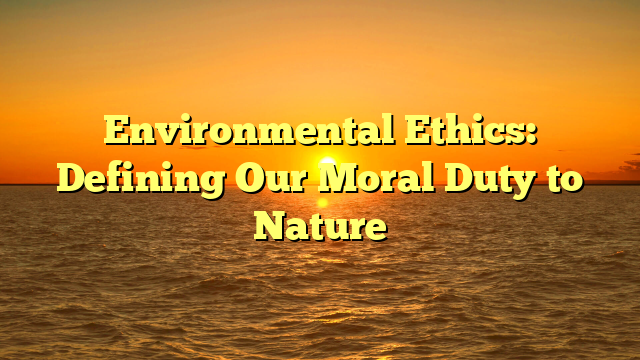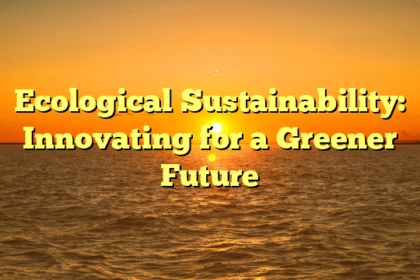Environmental Ethics
Within the age of local weather change and environmental degradation, the idea of environmental ethics has emerged as a vital subject of research that examines the ethical relationship between people and the pure world. It addresses profound questions: Do we’ve an ethical obligation to guard the atmosphere? What rights does nature possess? How can we set up a sustainable relationship with our environment? This text goals to delve deeply into these questions, providing insights into the ethical obligation we bear in the direction of nature whereas emphasizing the significance of integrating environmental ethics into day by day decision-making and coverage improvement.
Understanding Environmental Ethics

Defining Environmental Ethics
Environmental ethics could be understood as a department of philosophy that explores the moral dimensions of human interactions with the pure atmosphere. It challenges us to judge our actions in mild of their penalties for not simply human beings but in addition non-human entities comparable to animals, crops, and whole ecosystems.
Historic Background
The roots of environmental ethics could be traced again to historic philosophies, nevertheless it gained important traction within the twentieth century. Key figures comparable to Aldo Leopold, whose “Land Ethic” emphasizes the necessity to respect the land as a part of our group, and Rachel Carson, who raised consciousness concerning the risks of pesticides in her e book “Silent Spring,” laid the groundwork for contemporary discussions on the subject.
Key Ideas in Environmental Ethics
Anthropocentrism vs. Ecocentrism
One of many main debates inside environmental ethics is between anthropocentrism (human-centered ethics) and ecocentrism (earth-centered ethics).
-
- Anthropocentrism posits that people maintain intrinsic worth, and pure sources exist primarily for human profit. This viewpoint can result in exploitative practices that prioritize financial acquire over ecological sustainability.
-
- Ecocentrism, alternatively, acknowledges the intrinsic worth of all residing organisms and ecosystems. This attitude promotes a extra holistic view of nature, contemplating the interconnectedness of life and emphasizing the necessity for conservation.
Deep Ecology
Deep ecology is a philosophy that advocates for the inherent value of all residing beings, no matter their utility to human wants. It prompts people to re-evaluate their relationship with nature, encouraging a profound dedication to environmental preservation.
Ecofeminism
Ecofeminism merges ecological issues with feminist ones, highlighting the interconnectedness between the exploitation of girls and the degradation of nature. This attitude underscores that each social justice and environmental safety are intertwined points requiring complete options.
The Ethical Accountability Towards Nature
Intrinsic vs. Instrumental Worth
Understanding the distinction between intrinsic and instrumental worth is essential in environmental ethics.
-
- Intrinsic worth means that nature has value in and of itself, no matter human use. This standpoint encourages us to guard it for its personal sake.
-
- Instrumental worth, alternatively, views nature primarily when it comes to its usefulness to people. When human welfare is prioritized, moral issues for non-human entities usually diminish.
Emphasizing intrinsic worth might shift our strategy to the atmosphere and encourage conservation efforts.
Ethical Issues for Future Generations
A major side of environmental ethics is our obligation to future generations. The alternatives we make in the present day concerning useful resource consumption, environmental insurance policies, and local weather motion will affect the lives of generations to come back. It’s our accountability to make sure that they inherit a world able to sustaining human and non-human life alike.
Addressing Present Environmental Challenges
Local weather Change and Its Moral Implications
Local weather change poses one of the crucial urgent moral challenges of our time. It raises questions on equity, accountability, and accountability. Susceptible communities are disproportionately affected, usually having contributed the least to greenhouse fuel emissions.
By making use of environmental ethics, we will advocate for insurance policies that prioritize local weather justice, making certain that marginalized communities obtain help and that their voices are a part of decision-making processes.
Biodiversity Loss
The fast lack of biodiversity is one other moral situation calling for pressing motion. Each species performs a task in sustaining the steadiness of ecosystems. The extinction of species not solely disrupts these programs but in addition diminishes the collective heritage of life on Earth.
From an environmental ethics perspective, the depletion of biodiversity is intrinsically mistaken. Preserving ecosystems and species must be an ethical crucial, rewarding efforts towards conservation and sustainable practices.
The Function of Schooling and Consciousness
Selling Environmental Literacy
Elevating consciousness about environmental ethics and the significance of sustainable practices is crucial. Academic packages that incorporate environmental ethics into their curricula can empower future generations to make knowledgeable choices.
By fostering a way of connection and ethical accountability in the direction of nature, we will domesticate advocates for sustainability who acknowledge the worth of defending each the Earth and its inhabitants.
Neighborhood Involvement and Activism
Lively involvement in native environmental points is essential for selling environmental ethics. Neighborhood-led initiatives, like clean-up drives, tree-planting occasions, and environmental advocacy, can create a tradition of accountability. Help for insurance policies that defend pure sources strengthens the connection between moral ideas and sensible motion.
Conclusion
Environmental ethics challenges us to rethink our relationship with nature, shaping our ethical duties in the direction of the atmosphere. By contemplating the intrinsic worth of nature, understanding our duties to future generations, and recognizing the moral implications of local weather change and biodiversity loss, we will forge a path towards sustainable coexistence.
Actionable Insights
Listed below are some sensible steps you possibly can take to include environmental ethics into your life:
-
- Educate Your self and Others: Foster conversations about environmental ethics inside your group. Share data on sustainable practices, local weather justice, and conservation.
-
- Have interaction in Native Initiatives: Volunteer for native environmental organizations or take part in community-based sustainability tasks.
-
- Make Aware Decisions: Help eco-friendly merchandise, scale back waste, and follow sustainable consumption in your day by day life.
-
- Advocate for Coverage Change: Write to native representatives advocating for insurance policies that prioritize environmental safety and sustainability.
-
- Replicate on Your Life-style: Think about how your actions affect the atmosphere and discover methods to align your way of life with moral ideas.
By taking these steps, we will every contribute to a extra moral and sustainable relationship with the pure world, making certain that we honor our ethical obligation to nature for generations to come back.







